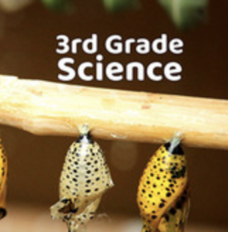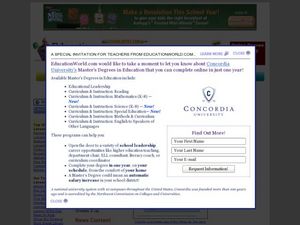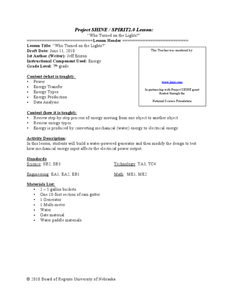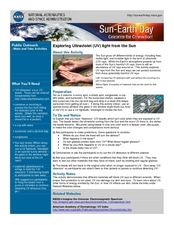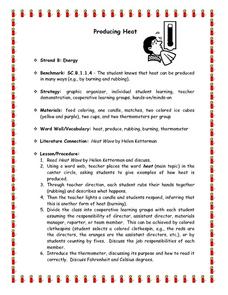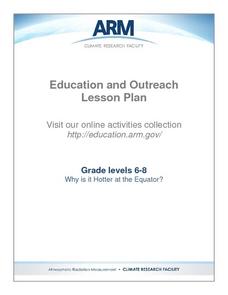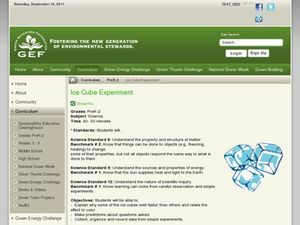Utah Education Network (UEN)
Utah Open Textbook: 3rd Grade Science
How do we interact with Earth? Scholars learn about the sun, Earth, moon, forces, gravity, and heat sources by reading a text and performing hands-on demonstrations. They also differentiate between living and non-living things using...
Colorado State University
How Can I Turn a Solar Oven into a Refrigerator?
Whether you want to heat things up in science class or cool things down a bit, an intriguing lab's got you covered! Science scholars explore the principles of thermodynamics using a solar oven, then change the conditions to turn their...
Science Matters
Motors
It's time to get moving! The 13th lesson in a 14-part unit on electricity and magnetism explores the relationship between electricity and mechanical energy. Budding scientists build motors and experiment with different components to...
Curated OER
Physical Science: Solar Energy
Pupils review and discuss how Solar energy and electricity produce light and heat. They create a photo/picture journal and include pictures taken during solar energy activities to a PowerPoint slide presentation.
Curated OER
Light Bulbs Save Energy
Students read a story called New Bulbs Provide More Light, Save Energyand answer vocabulary and comprehension questions about it. In this current events energy saving light bulb lesson plan, students respond to literature by answering...
Curated OER
Energy/Light/Heat/Sound
Fourth graders study the properties of heat in this series of lessons. They discuss sources of heat and experiment to determine its properties. They identify insulators and conductors by measuring temperatures, and graphing their data....
Curated OER
Do Different Colors Absorb Heat Better?
Students work together to test how the color of a material affects how much heat it absorbs. They make predictions and take notes on their observations. They discover how engineers use this type of information.
Curated OER
Check Out Lights and Shields with Beads
Learners explore Ultraviolet detecting beads and conduct several investigations with them. In this investigative lesson students participate in an experiment to see the harmful effects of UV light and discuss their findings.
Curated OER
The Invisible Energy in Light
Students investigate radiant energy. For this earth science lesson, students use solar beads and clear sunscreen to observe radiant solar energy. Students note observations.
Curated OER
Heat and Color
Sixth graders conduct a simple experiment to explore the ways that color can affect heat transfer. They review the three ways that heat can transfer: conduction, convection and radiation.
Curated OER
Forms of Energy
Students, working in expert groups, study a form of energy. They plan a slide show presentation using pictures, clip art, and student taken digital pictures that show the energy type they have become experts in. They use a planning sheet...
Curated OER
Heating the Earth
Middle schoolers explore how the angle of sunlight affects the Earth's temperature and seasons and then apply this understanding to their local situation.
Curated OER
Student Exploration: Energy Conversions
In this earthquake exploration worksheet, students complete 3 prior knowledge questions, then use "Energy Conversions Gizmo" to conduct several activities, completing short answer questions when finished.
Curated OER
Who Turned on the Lights?
Seventh graders discuss how energy is transformed from one form to another. In this physics lesson, 7th graders design and build their own hydro generator. They identify the factors that affect its energy production.
Curated OER
Applied Science - Built Environment Post Lab (Energy)
Students study science. In this efficiency activity, students explore different forms of energy and compare them to determine which works the best. They work independently to create a collage of different energy sources (using magazine...
Curated OER
Exploring Ultraviolet (UV) Light From the Sun
Students identify the different energy given off by the sun. For this earth science lesson, students predict where the UV beads will turn the darkest color. They explain the importance of using UV protection.
Pennsylvania Department of Education
Energy in Motion
Fifth graders explore energy transfer. In this thermal energy lesson, 5th graders stretch rubber bands several times and estimate the band's temperature change. Students identify this action as an example of thermal energy. Students...
Curated OER
Producing Heat
Students listen to "Heat Wave" by Helen Ketterman and discuss the story by creating a word web with heat as the main topic. They break into groups and conduct an experiment using a thermometer to record the temperature of melting ice...
Curated OER
Energy Is Everywhere
Students determine the difference between renewable and non-renewable resources and identify the different forms of energy. They discuss life without energy and where energy comes from before reading an article about the different...
Curated OER
Comparing Light Bulbs
Fifth graders compare filaments in different light bulbs. In this science lesson, 5th graders view the filaments of light bulbs under a microscope.
Curated OER
Making Energy "trails"
Students explore ten different stations that demonstrate either chemical, kinetic, or mechanical energy. They examine the way energy is transferred during each station's hands-on activity. Stations include vinegar and baking soda,...
Curated OER
Capturing Renewable Energy
Students watch a video segment on the engineering design process, then design a storage system for renewable energy. Students brainstorm and research ways in which renewable energies such as solar and wind power can be stored.
Curated OER
Why Is It Hotter At the Equator?
Middle schoolers investigate the different heating effects of sunlight. They conduct an experiment that demonstrates the way sunlight strikes the equator, the poles and other parts of the globe.
Curated OER
Ice Cube Experiment
Students explore the rate at which ice melts. In this science lesson, students place ice cubes on colored index cards and place them in direct sunlight. Students observe which ice cubes melt fastest and slowest.


